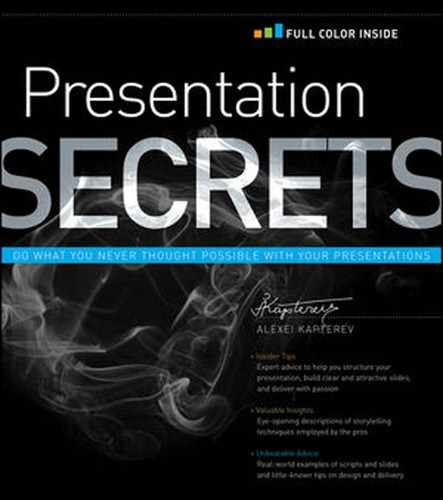VOICE
Voice is a big issue in public speaking. There's tons of advice about on how to speak, how to breathe, and how to resonate. Also, lots of people don't like the sound of their own voice. If you've ever tried to record your voice, you know it sounds a bit alien. We don't hear our voice the way other people do. When I first heard my voice recorded on an answering machine, I was enormously disappointed. That's not my voice! I wanted my voice to be lower and deeper. Later, when a career of professional public speaking appeared on the horizon, I decided to do something about it. I visited voice seminars for actors and public speakers, but none of them worked for me. They were too short; it seemed like voice requires longer practice. So, I decided to learn to sing.
NOTE Just if you're really interested, this is why your voice sounds different to yourself. When you attempt to speak, you automatically trigger the so-called vocalization-induced stapedius reflex. One of the nerves in your cranium contracts the stapedius muscle in your middle ear. At the same time, another cranial nerve contracts a muscle in the auditory tube, called the tensor tympani. The result is suppression of the sound of your own voice by approximately 20 decibels. Earwax further decreases the sound intensity. All mammals have this reflex, and birds do, too. Otherwise, they'd go deaf from their own tweeting.
I always loved singing and was naturally good at it as a child. However, by adolescence, my voice had deteriorated, and I'd lost those few vocalizing skills that I had. So, at the age of 27 I got myself a teacher and spent three years learning how to sing in classical Italian fashion. I started with Russian folk songs, which (like most folk songs) require a very strong voice and breath. After about a year, I switched to romances and sentimental art songs, which were very popular in the early and mid-20th century in Russia. They require much less power and much more artistry. Compared to folk songs, romances are very complex; they are about love and pain and death and fate, all at the same time. You need to feel what you're singing.
So, I did this for a while. I was actually quite good and even gave a couple of concerts. But you know what—several years later, my voice wasn't any lower or deeper. I can make it deeper when I make a conscious effort, but when I let it go, it goes back to normal. Of course, when I need to be heard, I am heard. I was once giving a seminar for 150 participants in a forest without a microphone (please don't ask why). It did put considerable strain on my vocal cords, but they didn't even hurt next day and my voice was intact. So, what's the moral here? Do you need to train your voice if you're a professional public speaker? Maybe, but I don't think it's a strict requirement. Do you need to take lessons if you speak only on occasion? I seriously doubt it. Granted, if you have a speech impediment, it's good to have it corrected—but that's out of the scope of this book. You don't like how you sound? One way to get over this is to record yourself reading your favorite short story and then listen to the recording for some time. After a while, you'll get accustomed to your voice.
The research by Estrada et al. just says that your voice should be strong and that you should speak to the microphone if you have one. The emphasis is again on clarity. I honestly don't know whether Guy Kawasaki, Steve Jobs, or Larry Lessig took any voice lessons. My key finding from two years of singing Russian romances was that people just don't sing like this anymore. Early 20th century singing (as well as public speaking) borrowed a lot from theater. Theater implies a stage and a crowd sitting far away from the stage. They can't quite hear and see what's going on there. A good actor, then, was somebody who sounded louder and made vastly amplified gestures. Consequently, public speaking was full of theatrical mannerisms. It wasn't even speaking; it was declaiming. But look, we don't do this anymore. Contemporary speaking style is much more casual and conversational. You don't need to be a trained artist; you just need to be yourself. You need to be authentic.
Professionally-made video presentations are typically voiced by paid actors. However, on one occasion when we were making a presentation about Virtual Private Networks (a specialized computer subject), we decided to use a real system administrator as a voice actor because the professional voice actor we tried before obviously had no idea what he was talking about. I think this is the future. Again, if you watch performances by contemporary professional speakers like Malcolm Gladwell or Merlin Mann, you see that they are not actors. You might call them quirky. They have edge and obviously have a passion for what they're doing. They are “interesting characters,” but they aren't acting. They aren't expending any conscious effort to appear as somebody else. They are just being themselves.
